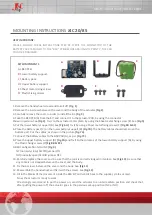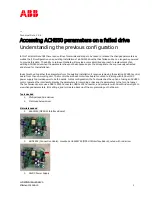
4
iso685_D00022_06_Q_CNEN/10.2016
ISOMETER® iso685...-CN
Commissioning
Commissioning of the device
1. Check that the ISOMETER® is properly connected to the
system to be monitored.
2. Connect the supply voltage to the ISOMETER®.
3. Connect the mains voltage.
4. When the ISOMETER® is operated for the first time after
switching on the mains voltage, a commissioning wizard
appears on the display that guides you through the commis-
sioning process step by step. For recommissioning, the com-
missioning wizard can be opened manually via the device
menu.
Execute the commissioning wizard and carry out the required
settings.
5. The device carries out a self test in four steps. However, the
alarm relays are not checked during this test. After comple-
tion of the test, the measured insulation resistance is shown
on the display. If the value exceeds the response values indi-
cated in the lowest line of the display, the message "OK" will
additionally be displayed. If a fault is detected during the self
test, a fault message will appear on the display.
Check the function using a genuine insulation fault. Check the
ISOMETER® in the system being monitored, e.g. using a suitable
resistance against earth.
Commissioning of the ISOMETER®s iso685…-P-CN with an
insulation monitoring device (EDS)
1. Put the ISOMETER® into operation as described before.
2. Put the EDS into operation as described in the respective
documentation.
3. Set different bus addresses for the ISOMETER® and each EDS.
4. Deactivate all measuring channels of the EDS to which no
transformer is connected.
To navigate within the menu and for parameter setting use the
buttons illustrated below.
The profile "power circuits" is suitable for most of the IT
systems. For a description of the profiles refer to the
manual.
The relays are de-energised until the commissioning
process is finished.
MENU
ESC
OK
Start the menu
1x Escape from the operating step, back
>1x Stop commissioning wizard
Confirm entry
UP button: to move up in the menu,
increase the value.
DOWN button: to move down in the menu,
decrease the value
Left arrow button: back in the menu,
to select a section.
Right arrow button: to go to the next menu,
select a section
启动
设备的启动
1. 检查 ISOMETER® 是否正确的连接到被监视系统上。
2. 绝缘监视仪 ISOMETER® 连接电源电压。
3. 连接主电压。
4. 当 ISOMETER® 在闭合主电压后进行首次操作,会有启动
向导指导您如何一步步的进行启动。关于重启,可以通过
设备菜单手动打开启动向导。执行启动向导并且完成所要
求的设置。
5. 设备在 4 个步骤内完成自检。当然,在这个测试过程中不
会检查报警继电器。完成自检后,测量的绝缘阻值会显示
在液晶屏上。如果值超过液晶屏底部显示的响应值,会显
示 “OK”。如果在自检过程中有故障,在液晶屏上会显
示故障信息。
使 用 绝 缘 故 障 来 检 查 这 项 功 能。检 查 被 监 视 系 统 的
ISOMETER®
,例如使用合适的对地电阻。
启动带绝缘监视仪的 ISOMETER®s iso685…-P-CN (EDS)
6. 把 ISOMETER® 置入之前描述的操作中。
7. 把 EDS 置入其文件描述的操作中。
8. 为 ISOMETER® 和每个 EDS 设置不同的总线地址。
9. 停用所有 EDS 的测量通道,保证没有电流互感器连接。
根据向导,在菜单和参数设置中使用下面所示的按钮。
该配置文件 “ 电源电路 ” 适用于大部分 IT 系统 .
更加详细的配置,请参考操作手册。
直到启动过程完成后,继电器断电。
MENU
ESC
OK
启动菜单
1x 避开操作步骤,返回
>1x 停止启动向导
确认回车
UP 按钮 : 在菜单中向上移动,
增加值。
DOWN 按钮 : 在菜单中向下移动 ,
减少值。
向左箭头按钮 : 返回上一级菜单,
选择一个部分。
向右箭头按钮 : 往下一级菜单,
选择一个部分。


























